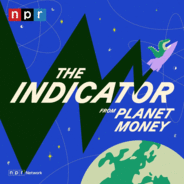Former Venezuelan leader, Nicolás Maduro, appeared in a New York court yesterday. He’s facing drug-trafficking and weapons charges after the U.S. abducted him and his wife in an explosive operation over the weekend. But is there any credibility to the drug-trafficking accusations? And what does the cocaine supply chain look like in 2026?Today on the show, tracing cocaine’s journey from the Andes to the streets of U.S. cities.Further reading: Ioan Grillo – El NarcoRelated episodes: Venezuela’s economic descent (Updated)Why Are Venezuelans Starving?Lessons from a former drug dealerFor sponsor-free episodes of The Indicator from Planet Money, subscribe to Planet Money+ via Apple Podcasts or at plus.npr.org. Fact-checking by Cooper Katz McKim and Sierra Juarez. Music by Drop Electric. Find us: TikTok, Instagram, Facebook, Newsletter.Learn more about sponsor message choices: podcastchoices.com/adchoicesNPR Privacy Policy

Wirtschaft
The Indicator from Planet Money Folgen
A bite-sized show about big ideas. From the people who make Planet Money, The Indicator helps you make sense of what's happening in today's economy. It's a quick hit of insight into money, work, and business. Monday through Friday, in 10 minutes or less.
Folgen von The Indicator from Planet Money
300 Folgen
-
Folge vom 06.01.2026How cocaine smuggling through Latin America really works
-
Folge vom 05.01.2026Why China pulled the plug on JapanJapan’s new prime minister Sanae Takaichi made waves last fall after saying her country might intervene if China invaded Taiwan. In response, China launched state-organized boycotts against Japan — canceling concerts, restricting seafood imports, and even recalling pandas. Today on the show, what does it look like for a state to organize a boycott, and does it work? Related episodes: How Japan’s new prime minister is jolting marketsWhen do boycotts work? Forging Taiwan's Silicon Shield For sponsor-free episodes of The Indicator from Planet Money, subscribe to Planet Money+ via Apple Podcasts or at plus.npr.org. Fact-checking by Sierra Juarez. Music by Drop Electric. Find us: TikTok, Instagram, Facebook, Newsletter. Learn more about sponsor message choices: podcastchoices.com/adchoicesNPR Privacy Policy
-
Folge vom 03.01.2026Venezuela’s economic descent (Updated)At The Indicator, we’ve been following the conditions in Venezuela over the years. In 2024 we covered how Venezuela’s economy went into freefall, and have been checking in with an economist there frequently — including after the U.S. attacked over the weekend, deposing its leader Nicolás Maduro. On today’s show, we’re revisiting our episode about Venezuela’s economy, and hear from our contact in Caracas. Send us questions you’d like The Indicator to answer on future episodes about Venezuela: indicator@npr.org. Related episodes: The Measure of a Tragedy Why are Venezuelans starving? An Economist in Caracas: Day In The Life For sponsor-free episodes of The Indicator from Planet Money, subscribe to Planet Money+ via Apple Podcasts or at plus.npr.org. Music by Drop Electric. Find us: TikTok, Instagram, Facebook, Newsletter. Learn more about sponsor message choices: podcastchoices.com/adchoicesNPR Privacy Policy
-
Folge vom 02.01.2026We resolve to watch these 2026 indicators2025 is finally over. We had bad consumer sentiment vibes, tariffs, and a seemingly ascendant stock market. And those are just a few indicators from last year! As we enter 2026, what indicators should we keep an eye on … in the future? On today’s episode, our top indicator predictions for the new year.Related: What AI data centers are doing to your electric bill Tariffs. Consumer sentiment. Cape ratio. Pick the Indicator of the Year! What indicators will 2025 bring? For sponsor-free episodes of The Indicator from Planet Money, subscribe to Planet Money+ via Apple Podcasts or at plus.npr.org. Fact-checking by Sierra Juarez. Music by Drop Electric. Find us: TikTok, Instagram, Facebook, Newsletter. Learn more about sponsor message choices: podcastchoices.com/adchoicesNPR Privacy Policy
